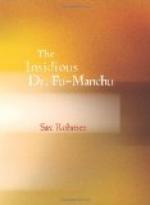I tried to close my eyes—or to turn them away from the reeling forms of the men who were trapped in that poison-hole. It was useless:
I must look.
The bearer of the lamp had dropped it, but the dim, eerily illuminated gloom endured scarce a second. A bright light sprang up—doubtless at the touch of the fiendish being who now resumed speech:
“Observe the symptoms of delirium, Doctor!” Out there, beyond the glass door, the unhappy victims were laughing— tearing their garments from their bodies—leaping—waving their arms— were become maniacs!
“We will now release the ripe spores of giant entpusa,” continued the wicked voice. “The air of the second cellar being super-charged with oxygen, they immediately germinate. Ah! it is a triumph! That process is the scientific triumph of my life!”
Like powdered snow the white spores fell from the roof, frosting the writhing shapes of the already poisoned men. Before my horrified gaze, the fungus grew; it spread from the head to the feet of those it touched; it enveloped them as in glittering shrouds. . . .
“They die like flies!” screamed Fu-Manchu, with a sudden febrile excitement; and I felt assured of something I had long suspected: that that magnificent, perverted brain was the brain of a homicidal maniac—though Smith would never accept the theory.
“It is my fly-trap!” shrieked the Chinaman. “And I am the god of destruction!”
CHAPTER XXVI
The clammy touch of the mist revived me. The culmination of the scene in the poison cellars, together with the effects of the fumes which I had inhaled again, had deprived me of consciousness. Now I knew that I was afloat on the river. I still was bound: furthermore, a cloth was wrapped tightly about my mouth, and I was secured to a ring in the deck.
By moving my aching head to the left I could look down into the oily water; by moving it to the right I could catch a glimpse of the empurpled face of Inspector Weymouth, who, similarly bound and gagged, lay beside me, but only of the feet and legs of Nayland Smith. For I could not turn my head sufficiently far to see more.
We were aboard an electric launch. I heard the hated guttural voice of Fu-Manchu, subdued now to its habitual calm, and my heart leaped to hear the voice that answered him. It was that of Karamaneh. His triumph was complete. Clearly his plans for departure were complete; his slaughter of the police in the underground passages had been a final reckless demonstration of which the Chinaman’s subtle cunning would have been incapable had he not known his escape from the country to be assured.
What fate was in store for us? How would he avenge himself upon the girl who had betrayed him to his enemies? What portion awaited those enemies? He seemed to have formed the singular determination to smuggle me into China— but what did he purpose in the case of Weymouth, and in the case of Nayland Smith?




